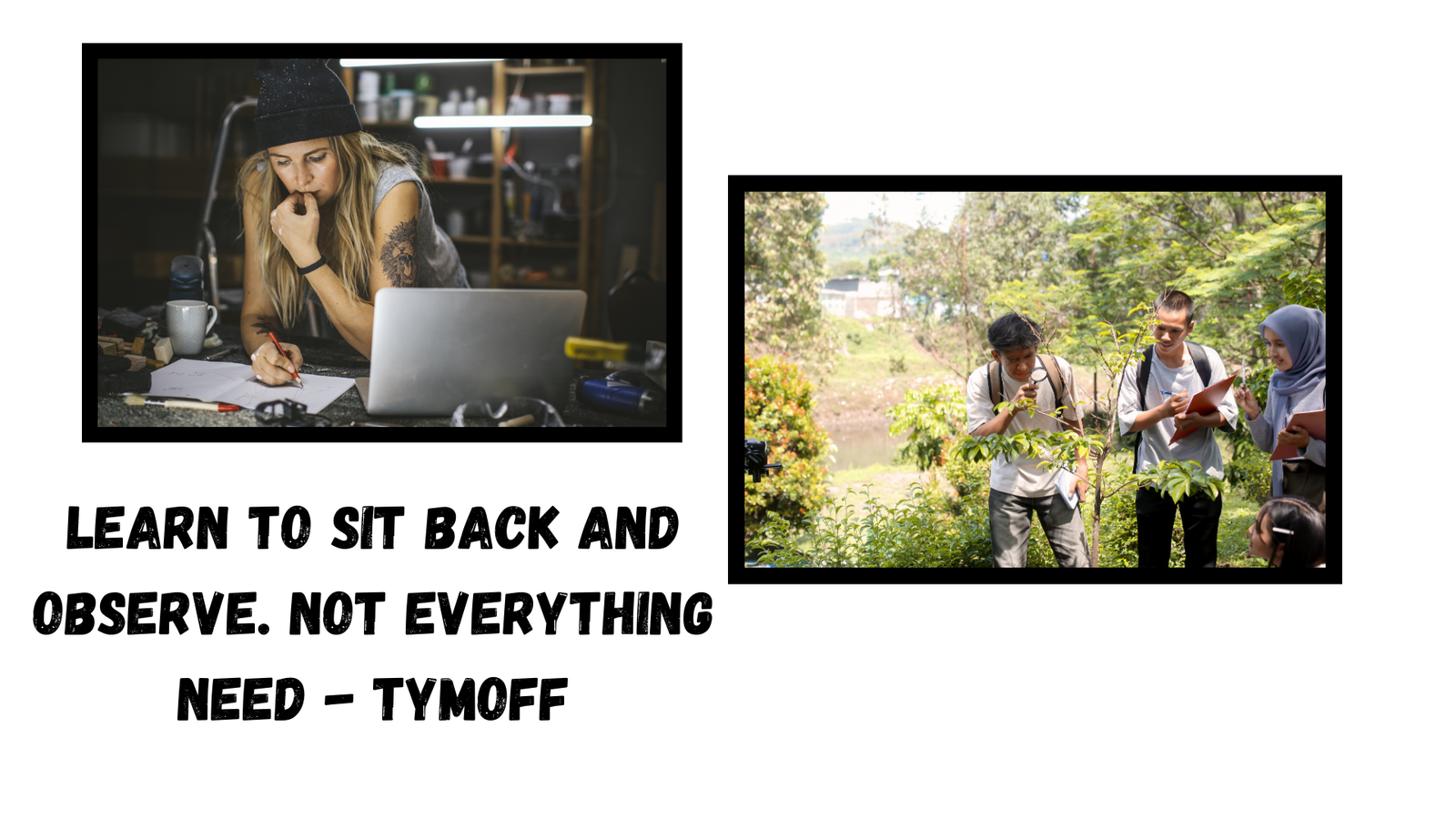In today’s fast-paced world, it’s easy to feel compelled to act on every situation that arises. With information flowing at an unprecedented rate and responsibilities piling up, the urge to intervene, solve, or fix everything can become overwhelming. However, there is profound wisdom in the phrase, “Learn to sit back and observe. Not everything needs your intervention.” This philosophy, often associated with the modern thinker Tymoff, teaches us to embrace patience, discernment, and self-awareness. Let’s explore why learning to observe is an invaluable skill and how it can be integrated into our daily lives.
The Power of Observation
Observation is a skill that extends beyond merely watching. It involves listening, analyzing, and understanding situations without rushing to conclusions or actions. This skill helps us better comprehend the world around us and fosters emotional intelligence. By sitting back and observing, we allow ourselves the time to gain perspective and clarity.
Observation teaches us to recognize patterns, understand motivations, and assess situations objectively. For instance, in a professional setting, reacting impulsively to a problem might worsen the issue. Observing first allows one to identify the root cause and devise an effective solution. Similarly, in personal relationships, taking time to listen and observe can prevent misunderstandings and strengthen bonds.
Why Intervention Isn’t Always Necessary
The need to act is often driven by the desire for control or the fear of uncertainty. However, not every situation demands a response. Sometimes, intervention can disrupt natural processes, escalate conflicts, or hinder personal growth for others. Knowing when to step back is as important as knowing when to act.
For example, in parenting, over-involvement can stunt a child’s independence. Allowing children to navigate challenges on their own helps them build resilience and problem-solving skills. Similarly, in workplaces, micromanaging employees can demoralize them and stifle creativity. Trusting people to handle their responsibilities while observing their progress fosters a healthier and more productive environment.
The Philosophy Behind Tymoff’s Quote
Tymoff’s advice encourages mindfulness and intentional living. It suggests that not every problem requires immediate action and that sometimes, the best approach is to simply observe. This mindset aligns with the principles of minimalism and stoicism, emphasizing the value of focusing energy on what truly matters.
Stoicism, a philosophy dating back to ancient Greece, teaches that we should distinguish between what we can and cannot control. By sitting back and observing, we practice this principle, conserving energy for actions that align with our values and goals. This approach reduces stress and fosters a sense of inner peace, as we learn to accept that not everything is within our power to change.
Practical Steps to Embrace Observation
- Pause Before Reacting Cultivate the habit of pausing before responding to situations. Use this time to analyze the context, emotions involved, and potential outcomes. A simple deep breath can create the mental space needed to approach a problem with clarity.
- Practice Active Listening Observing isn’t limited to visual cues. Listening attentively to others without formulating a response in your mind allows you to fully understand their perspective. This practice enhances empathy and strengthens communication.
- Reflect Daily Dedicate a few minutes each day to reflect on your actions and decisions. Journaling or meditating can help you identify patterns, recognize areas for growth, and reinforce the habit of observation.
- Let Go of Control Accept that you cannot control everything. Trust the process and have faith that some situations will resolve themselves without your intervention. This mindset shift can significantly reduce anxiety.
- Observe Nature Spend time in nature to hone your observational skills. Watch how ecosystems function seamlessly without external interference. This practice can inspire a sense of balance and patience.
Benefits of Sitting Back and Observing
- Improved Decision-Making Observing allows you to gather more information, leading to informed and thoughtful decisions. It minimizes impulsive reactions that can result in regrettable consequences.
- Enhanced Emotional Intelligence By observing your emotions and those of others, you develop a deeper understanding of interpersonal dynamics. This awareness fosters better relationships and conflict resolution skills.
- Increased Patience Sitting back and observing teaches patience, a virtue often overlooked in today’s hurried lifestyle. Patience helps us navigate challenges with grace and composure.
- Reduced Stress Letting go of the need to intervene in every situation alleviates stress and promotes mental well-being. Observing teaches us to focus on what we can control and accept what we cannot.
- Growth Through Learning Observation opens the door to continuous learning. By stepping back, we gain new perspectives, challenge assumptions, and expand our understanding of the world.
Challenges and How to Overcome Them
Adopting the habit of sitting back and observing isn’t without its challenges. It requires breaking free from deeply ingrained patterns of impulsivity and control. Here are some common obstacles and ways to address them:
- Impatience: Impatience often stems from the desire for quick results. Counter this by reminding yourself of the long-term benefits of observation and practicing mindfulness techniques.
- Fear of Judgement: Worrying about how others perceive your inaction can be a barrier. Focus on your intentions and trust that observing is a conscious choice, not a sign of weakness.
- Difficulty in Letting Go: Letting go of control can be challenging. Start small by allowing others to take the lead in minor situations and gradually build trust in the process.
Conclusion
Learning to sit back and observe is a powerful practice that fosters clarity, patience, and resilience. Tymoff’s timeless advice reminds us that not every situation requires our intervention. By embracing observation, we not only improve our decision-making and relationships but also cultivate inner peace.
As you move forward, challenge yourself to pause, reflect, and observe before reacting. This simple yet transformative habit can help you navigate life’s complexities with wisdom and grace. Remember, sometimes the best action is inaction, and the greatest strength lies in stillness.



